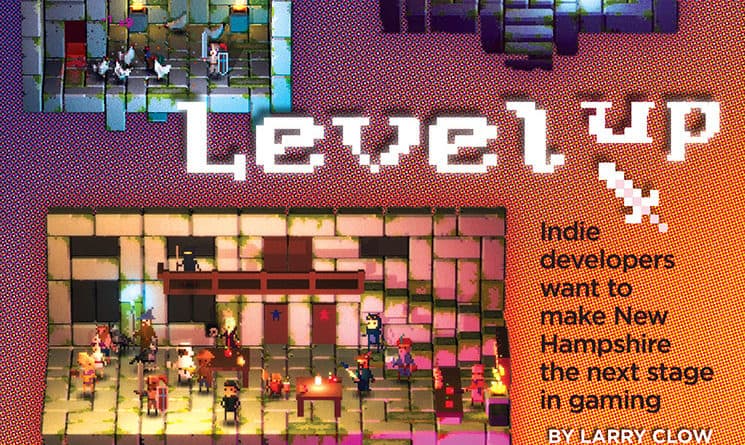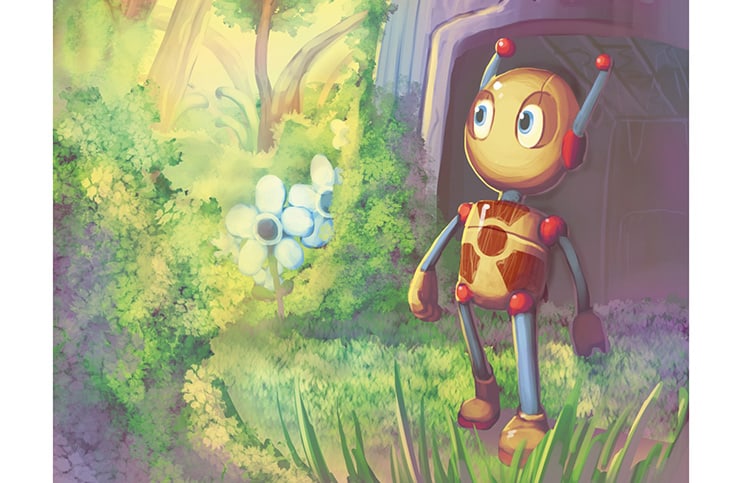The first video game Jon Dearborn of Barrington officially sold through his design studio, DinoMage Games, was “Gladiator.” Originally an early 1990s PC game, “Gladiator” lets players recruit soldiers, archers, mages, and other fantasy-types into an army and take down monsters and assorted evil-doers.
“This was a game I grew up playing … and I fell in love with it,” Dearborn says. “And then, 10 years later, I find out it had been open-sourced and was using the same technology I was using, and I (thought), I owe that game. I loved it so much and I need to make it better.”
Dearborn took the source code and adapted it for the Android operating system, cleaned up some bugs, added new features, and started selling it in Google’s app store.
“It was one of those full-circle feelings,” he says. “It’s like, wow, I just did that — I ported that game to Android and now it’s for sale.”
That was in 2013. Since then, Dearborn has been plugging away at other projects, including “Don’t Blow It,” a four-player cooperative game in which players must use teamwork to solve puzzles, and “Tangible Math,” an educational app that Dearborn created in part to help him and his wife homeschool their three kids.
Making games isn’t Dearborn’s full-time job. He’s primarily a stay-at-home homeschooling dad; this fall, he’ll teach courses in programming and video game physics at Southern New Hampshire University (SNHU). But his dream is to eventually support the family through designing games.
“But that’s a very challenging goal for anyone to achieve, so we’ll see if we get there,” he says.
Dearborn is part of a small but rapidly growing community of independent game developers throughout New Hampshire. The Seacoast is part of the scene, too, and an upcoming Digital Portsmouth event at The Music Hall on July 29 highlights the art, and business, of making games.
“Once I was back here, it was painfully obvious how ready the state was to have this industry here.” — David Carrigg,
co-founder of Game Assembly
What had been a scattered group of indie studios and lone developers has coalesced in the last year. Much of the activity is focused in and around Manchester — a group of developers established a chapter of the International Game Developers Association (IGDA) there last year, and just a few weeks ago, the state’s first co-working space for game developers, Game Assembly, opened up. Meanwhile, colleges and universities, including New Hampshire Technical Institute (NHTI) and SNHU, are expanding their game design degree programs.
According to David Carrigg, a game developer and one of the co-founders of Game Assembly, developers and educational institutions are working together to grow the game industry in the state — and keep young developers living and working in New Hampshire.
Building on history
New Hampshire has a solid place in video game history. Engineer Ralph H. Baer, who lived in the Granite State for much of his life, developed what would become the first commercial home video game console while working at a defense company in Nashua in the 1960s. And, in Laconia, Funspot houses the American Classic Arcade Museum, a shrine to vintage gaming that hosts an annual arcade game and pinball tournament.
And indie developers in the state think New Hampshire has a chance of becoming a major part of gaming’s future.
“I think (the game industry) is going to skyrocket over the next three to five years” in New Hampshire, Carrigg says. “I think we’re going to start to get bigger game companies coming into the area, or at least, they’ll have much more interest in what we’re producing here.”
Carrigg is 29, and he and other young developers are building that foundation. Originally from the Lakes Region, Carrigg worked for a game development company after college for three years. He wanted to make his own games, though, and he and a few friends established their own studio, Retro Affect. He was living in Arizona at the time, and after a couple of years, Carrigg decided to move the studio back to his home state.
“Once I was back here, it was painfully obvious how ready the state was to have this industry here,” he says.
A 2013 New Hampshire Public Radio story connected Carrigg with Neal Laurenza, another New Hampshire developer, and other game designers. Though Carrigg was living in New Hampshire, he was spending a lot of time in Cambridge, Mass., at the Indie Game Collective, a co-working space for developers.
“I was going back and forth … and the whole time, I was thinking, this is really silly. We could be doing this in New Hampshire,” he says.
The first step was establishing a New Hampshire chapter for the IGDA. The group’s monthly meet-ups brought together developers from around the state who hadn’t had an opportunity to connect.
Once the IGDA chapter was established, they began work on the next step — a co-working space in Manchester where developers could rent a desk, work on projects, and collaborate with each other.
“We’re trying to push New Hampshire to the next level in the industry,” Carrigg says.
No barriers
The video game industry is huge. According to the Entertainment Software Association, 155 million Americans play video games. In 2014, game sales totaled some $15.4 billion — and that’s not including another $7 billion in sales for hardware and accessories.
According to an annual survey by Gamasutra, an online publication that covers the industry, the average industry salary in the Northeast was $76,677 in 2014. For indie developers, though, the numbers are lower — Gamasutra’s survey found that the average solo indie developer earned $11,812 in 2013, while individual members of an indie development team earned $50,833 on average. The indie game industry tends to attract young developers without families, according to Alix Stolzer of the game studio Robot Loves Kitty. “You come across this issue of having … this income that follows this up and down instability,” she says.
Still, the industry has grown quickly. Greg Walek is an instructor at NHTI and the program coordinator for the college’s animation and graphic game programming degree. Walek has been working on video games for more than a decade. He started teaching at NHTI eight years ago — back then, the first smartphones were just hitting the market, and jobs for game designers were scarce.
But then the industry exploded on multiple fronts, according to Walek. Nintendo’s Wii console became a hit with parents, grandparents, and other groups that, traditionally, weren’t gamers. Smartphone use expanded, and that meant more people were buying apps and games. And the industry saw a shift away from physically distributing games to selling them digitally. Games were everywhere, and you didn’t need a console or a disc to play them. That meant the doors were open for small studios and independent developers to start making and selling games.


